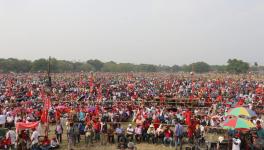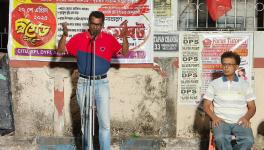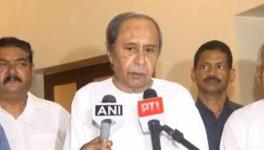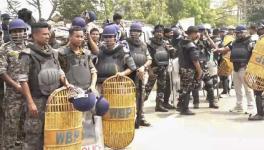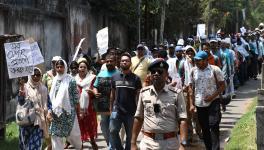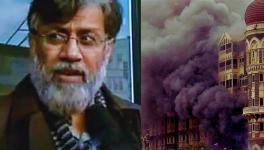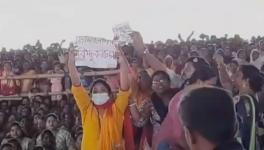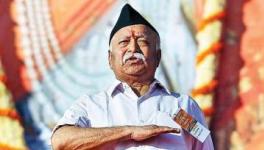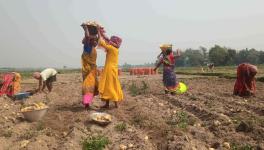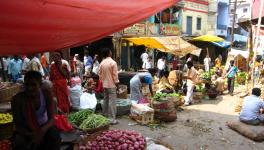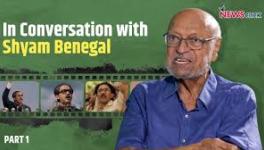Worried About BJP Push, Mamata Allows Durga Puja but Doctors Wary During Pandemic
Represntational use only
Kolkata: Even as the contours of West Bengal Chief Minister Mamata Banerjee’s campaign strategy for the Assembly elections, due in less than six months, have emerged, the state government’s inept handling of the pandemic has attracted renewed attention.
The medical fraternity has sounded a note of caution against the CM’s decision to allow community Durga Pujas somewhat freely, despite COVID-19 still posing a threat.
It is a situation where political compulsions seem to be taking precedence over public health concerns. The CM has chosen to not be seen doing anything that would give the Bharatiya Janata Party (BJP), which is keen on forming its first government in West Bengal, any opportunity to accuse her of being ‘anti-Hindu’.
Consequently, in her scheme of things, the Hindu festival of Durga Puja cannot be subjected to severe restrictions. The BJP has successfully branded her ‘pro-Muslim’ as she has, in successive elections, banked on the minorities who have a 28% vote share.
With much fanfare, Banerjee announced that community Durga Puja would be allowed and that organisers would be given a cash assistance of Rs 50,000 each. Financial help was also announced for Hindu priests in a bid to address their grievances as cash benefits for Muslim muezzins had been in place much earlier.
However, doctors’ warning against community Durga Pujas has queered the pitch for the CM, who is known for her autocratic style of functioning and has successfully established that hers is the last word in governance.
Several doctors’ organisations – Joint Platform of Doctors and West Bengal Doctors’ Forum – in their representation to the CM (she is also the health minister), said any laxity in implementing the strictest possible measures against public gatherings “might lead to a tsunami of infections”.
The doctors said that there had been a spike in COVID-19 cases in Kerala and Maharashtra after Onam and Ganesh Chaturthi, respectively. They also mentioned a steep rise in cases in Spain following International Women’s Day celebrations and a football match.
The joint platform has also written to all political parties, urging them to educate the public about the need to abide by the health protocols and the disastrous consequences that might result from laxity on this count. The joint conveners of the platform – Dr. Punyabrata Goon and Dr. Hiralal Konar – told NewsClick that neither the CM’s office nor political parties had reverted to them.
The doctors said they would have been happy to learn from the CM’s office about “what additional precautions are being devised and what penal measures are being contemplated for violations. The point should not be missed that fresh cases had started declining but, of late, the numbers were rising again,” they said, adding that West Bengal remains in the list of 10 worst-affected states.
The results of the Lok Sabha elections in 2019 seem to have jolted the CM. In a bid to regain the TMC’s hold over Bengal, she has been holding administrative meetings in the backward Jungle Mahal region and in North Bengal. These, in reality, are “administrative-cum-political” meetings as those present include not only the chief secretary but also district TMC leaders. “Halt intra-party feuds, and behave well with the people” is one piece of advice she is often heard giving to her party activists in the presence of the officials.
A Binary Narrative?
Given the situation, a few questions arise: Is the fact that the BJP had unexpectedly managed to bag as many as 18 seats in May, 2019, (which translates to 126 Assembly seats) weighing heavily on her mind? Does she appear to be not inclined to ignore the BJP’s vociferous ‘humein Bangal chahiye’ demand? Does she appear to be toeing the saffron party’s line that the contest is between it and the TMC in the state? This means not recognising the Left Front and Congress’ joint platform.
Political analyst Surajit C. Mukhopadhyayay, who teaches sociology at Amity University in Raipur, said BJP’s gain in 2019 will not be a factor and that as the elections draw near, there will be a quiet understanding at the lower levels between BJP and TMC supporters. Mukhopadhyayay said votes of both the Left Front and the Congress had gone to both the TMC and the BJP. The situation would change if the Left and the Congress are able to regain the support of their erstwhile voters.
Post-Diwali, the political landscape in West Bengal may see rapid changes. The BJP may not necessarily be making a correct political assessment about the state. Basically, being a Hindi heartland formation, its ethos isn’t compatible with that of the state.
In the sphere of education, BJP’s steam-rolling saffronisation is difficult to implement here; its attempts to gain sympathy by suggesting the party cares for educationist and social reformer, Ishwar Chandra Vidyasagar, is unlikely to pay dividends either. The party wants West Bengal in its kitty, but is it intellectually and politically equipped to be a logical claimant?
Sobhanlal Datta Gupta, ex-Surendra Nath Banerjee Professor of Political Science, University of Calcutta, said he had genuine doubts about the support base of BJP, which is consistently being projected by the media, and the situation in West Bengal is no different.
“Both, the TMC and BJP, have no long-term vision and they are content working for immediate gains. Both see their vote bank as the means to register electoral gains. The sudden inroads made by BJP in the 2019 elections, as a result of which the TMC tally declined abruptly, may be weighing on Mamata’s mind and that possibly explains her regular visits to the backward Jungle Mahal and North Bengal, where the saffron party made most of its gains,” he said.
Gupta said like the BJP, Mamata Banerjee may also be trying to send out the message that TMC’s fight is with BJP. “Therefore, TMC supporters and sympathisers should vote for her party. Another way of looking at it may be that the CM may want to see how the Left Front-Congress alliance shapes up and then decide on a strategy,” Gupta told NewsClick. He added that her handling of the pandemic and the migrant workers crisis will also play a part.
Professor Debasish Sarkar, principal of Chandernagore Colllege, is of the view that in handling the pandemic, the CM has shown the limitation of her “CM to DM” style of functioning. “Public health management is too important a matter to be left to the whims of the chief minister alone and it has the potential to influence people’s opinions about the administration. Unless there is a change, the state’s vulnerability to health hazards would only increase,” he said.
West Bengal, in Sarkar’s assessment, has seen a significant change post-Amphan, when the Opposition directly dealt with issues facing the affected people. “Mamata Banerjee is a hard-nosed politician and she must have weighed the pros and cons of the Opposition re-establishing its presence in areas where they were hounded out by her party activists. Now, she takes a positive view of the change and, perhaps, feels it’s good for her party,” the academic contended.
It has to be seen whether there is a new claimant for the Muslim vote. Also, the role of Mukul Roy, earlier second-in-command in Trinamool Congress and now a BJP vice-president, will be worth watching. Roy’s proven skill is in organising defections and the present state of the Congress in the state is because of the defections he organised into TMC with the knowledge of Mamata Banerjee, whose sole aim was to see the Congress reduced to a signboard.
The writer is an independent journalist based in Kolkata.
Get the latest reports & analysis with people's perspective on Protests, movements & deep analytical videos, discussions of the current affairs in your Telegram app. Subscribe to NewsClick's Telegram channel & get Real-Time updates on stories, as they get published on our website.









